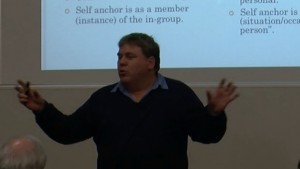Overview
we argue that both stress and wellbeing are also qualities of the collective experience of working in health and medical practice
The prevalence to process project starts with the acknowledgement that medical students and practitioners experience high levels of stress, and that the prevalence of stress is well established. We also support efforts aimed at helping individuals deal with stress and increasing awareness of mental health issues for individual medics. However, we argue that both stress and wellbeing are also qualities of the collective experience of working in health and medical practice. Identities such as medical student and doctor as well as career stage identities like intern, resident, house officer, registrar, and specialist consultant, play a central role in a sense of vocation, professional formation, and as resources in coping with job-related stressors. Our goal is to explore these processes involving various kinds of socially shared identities and how they might be a key resource in resilience and wellbeing.
History
As a social psychologist Ken was naturally interested in understanding the particular processes that occur in medical school that might exacerbate the impact of stress on wellbeing.
Ken Mavor started working on this project on joining the ANU Medical School in 2008. Ken’s main academic role in the Medical Education Unit was managing assessment over multiple years of the graduate medical program at the Australian National University. However, it was not long before Ken became aware of the level of stress that the students were reporting, confirmed by the extensive literature on medical student stress and the association with reduced wellbeing.
As a social psychologist Ken was naturally interested in understanding the particular processes that occur in medical school (or practice) that might exacerbate the impact of stress on wellbeing. After exploring the literature and conducting a few preliminary research projects, it became clear that there was an ongoing emphasis on understanding the prevalence of stress in medical education and practice but relatively less work on the underlying psychological processes that might better inform attempts to improve wellbeing.
This led to the key theme of the project: “Beyond prevalence to process”, which also became the title for a review and theoretical paper published in Medical Education in early 2014.
Early Phases in ANU Medical School
In the early years of the project, Ken worked with a medical student at the time (Erin O’Reilly), who had done an undergraduate degree in psychology. Erin went on to enrol in postgraduate medicine, and was elected student wellbeing officer in the local medical student association. Our first project looked at different types of stressor to see if both general life stressors and specific academic stressors in medical school independently contributed to levels of wellbeing in students. This initial study was eventually published in Teaching and Learning in Medicine.
 We also looked at how the medical student identity fitted into a more complex social understanding of self. Social psychology offers a number of models of how the structure and content of the self might be related to wellbeing, and we started to look at several of these models, in particular the idea of self-complexity (can medical students maintain a complex self under the pressures of medical school?) and also the nature of the medical student identity itself and how such a strong, high-status, and cohesive identity might itself help buffer students against the worst effects of stress.
We also looked at how the medical student identity fitted into a more complex social understanding of self. Social psychology offers a number of models of how the structure and content of the self might be related to wellbeing, and we started to look at several of these models, in particular the idea of self-complexity (can medical students maintain a complex self under the pressures of medical school?) and also the nature of the medical student identity itself and how such a strong, high-status, and cohesive identity might itself help buffer students against the worst effects of stress.
At this point, Kathy McNeill became involved in the project as a PhD (Clinical Psychology) candidate. Kathy felt that medical student wellbeing would be a good topic for her clinical studies that could have an important impact. Kathy ran several studies over the period of her PhD, looking at both complexity and identity, transitions into medical school, the impact of both positive and negative norms associated with medical student identity and impact on behaviour related to wellbeing. A study on identity and norms was conducted in collaboration with an undergraduate medical student, Analise Kerr, and that study eventually formed the basis for a paper in Perspectives in Medical Education. Kathy completed her PhD in 2013.
A move to St Andrews School of Psychology and Neuroscience
 In 2013, Ken took an opportunity to move to Scotland and the University of St Andrews to join the School of Psychology and Neuroscience. In the last few years at the Australian National University, Ken had the opportunity to take a Sabbatical visit to the UK, and had made links with several medical education researchers (in Cardiff, Dundee, Exeter, and Durham) interested in the role of identity in medical education, transitions into professional identities, and identity crises during training. The move to St Andrews has enabled these links to be explored further, and to expand the project in new directions.
In 2013, Ken took an opportunity to move to Scotland and the University of St Andrews to join the School of Psychology and Neuroscience. In the last few years at the Australian National University, Ken had the opportunity to take a Sabbatical visit to the UK, and had made links with several medical education researchers (in Cardiff, Dundee, Exeter, and Durham) interested in the role of identity in medical education, transitions into professional identities, and identity crises during training. The move to St Andrews has enabled these links to be explored further, and to expand the project in new directions.
As well as holding a position at St Andrews, Ken remained an adjunct Senior Lecturer in the ANU Medical School till 2016, and aspects of the project continue in Australia through the ANU. Being based in the Social Psychology group in St Andrews is also a major boon to the project, with an active research group interested in the social nature of the self and impacts on social change and health outcomes.

